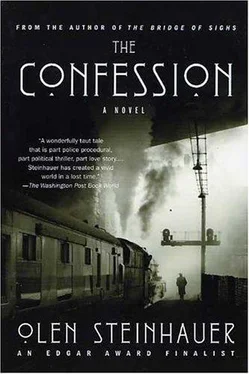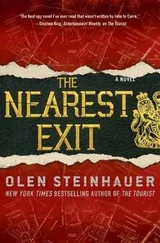Olen Steinhauer - The confession
Здесь есть возможность читать онлайн «Olen Steinhauer - The confession» весь текст электронной книги совершенно бесплатно (целиком полную версию без сокращений). В некоторых случаях можно слушать аудио, скачать через торрент в формате fb2 и присутствует краткое содержание. Жанр: Политический детектив, на английском языке. Описание произведения, (предисловие) а так же отзывы посетителей доступны на портале библиотеки ЛибКат.
- Название:The confession
- Автор:
- Жанр:
- Год:неизвестен
- ISBN:нет данных
- Рейтинг книги:5 / 5. Голосов: 1
-
Избранное:Добавить в избранное
- Отзывы:
-
Ваша оценка:
- 100
- 1
- 2
- 3
- 4
- 5
The confession: краткое содержание, описание и аннотация
Предлагаем к чтению аннотацию, описание, краткое содержание или предисловие (зависит от того, что написал сам автор книги «The confession»). Если вы не нашли необходимую информацию о книге — напишите в комментариях, мы постараемся отыскать её.
The confession — читать онлайн бесплатно полную книгу (весь текст) целиком
Ниже представлен текст книги, разбитый по страницам. Система сохранения места последней прочитанной страницы, позволяет с удобством читать онлайн бесплатно книгу «The confession», без необходимости каждый раз заново искать на чём Вы остановились. Поставьте закладку, и сможете в любой момент перейти на страницу, на которой закончили чтение.
Интервал:
Закладка:
Teodor was outside, eyeing the car before I turned off the engine. His washboard face was crossed by scars and pits. Farming had done it to him, that or the 1949 collectivization push. At family gatherings there were always veiled allusions to commissars starving them out of their complacency.
“Ferenc.”
“Teodor.”
We shook hands, and he asked how long the trip had taken. He always seemed to think he could judge the value of a man or a day by the economy of travel.
“Two hours, about.”
“Some good time, that.”
“My daughter around here somewhere?” I asked.
Teodor nodded at the house, and as we approached it he spoke beneath his breath: “How about my daughter?”
“Your guess.”
“Don’t be smart.”
“She’s in the city, I suppose.”
The old farmer opened the door for me, and Pavel, our black-and-tan dachshund, trotted up and let out a short bark.
Magda’s mother’s baked apples smelled sweet and fruity-it was all she knew how to cook. She came out of the kitchen, wiping fat fingers on her apron, and gave me a kiss. Pillow cheeks and thin lips.
“Hello, Nora.”
“Hello yourself.” She didn’t need to ask the question; she only needed to look significantly over my shoulder at the empty doorway.
Agnes stumbled out of the guest room holding a book and squinting through thick, black-framed glasses. “Hello, Daddy.”
Fourteen years old and, even behind glasses and foggy with sleep, showing strong signs of her mother’s lazy beauty. I could smell the boredom of these three weeks all over her.
We ate Nora’s meager potatoes and paprika outside in the shriveling, bush-lined private garden, shaded by the house. A dusty breeze from the apple orchard made the napkins tremble on the worn wooden table. Teodor kept on with his questions about the condition of the road, the shape of his dacha, and, after these practicalities were out of the way, the writing. “Is your book still in print?”
“It’s not,” I admitted as I finished the meal. “Maybe once I get this other one finished, they’ll print more, but not now.”
“And when will this second book be done?” asked Teodor. “It’s been-how long?”
“Four years,” said Nora, but without judgment.
“It took ten years to get that first one out,” I said.
“Daddy’s going to write a proletarian novel,” said Agnes. It was the second time she’d spoken since I arrived, and in her long grin I read a lovely irony.
“Like that man?” asked Nora. “What was his name?”
“I don’t know what I’ll write.”
Magda’s father leaned forward. “You mean you haven’t started? ”
I wanted to explain, again, that I was a militiaman. Maybe I had only one book in me-that was okay-and now I could go back to what I actually was. And lead, at least generally, a virtuous life. The brief celebrity had been good, the friends I’d made-the literary clique led by Georgi Radevych-and the supplemental income. Although the primary proceeds of the book went into the state bank, a personal allocation had bought the Skoda sitting outside, most of Agnes’s better clothes, and the big German radio set back at home. But now, the writing was probably finished. It certainly hadn’t come at the dacha, once my wife had left me again, and the last two weeks had been an unproductive alcoholic misery.
But I said nothing. I forced a smile and looked at Agnes in order to forget the old farm couple waiting for that next book.
3
Magda’s father was still sturdy despite the weathering he’d taken over the years, and could probably even stand up to me, were it to ever come to that. He was nearly as big as I was, and I’d wondered often if this was part of Magda’s attraction to me, that I was a large man, like her father.
We’d eaten the apples, which were blander than they smelled, and the women had gone inside. Teodor uncorked a bottle of northern red for us, but did not pour. This was the obligation of entering his house and eating his food: the talk. For a while, we only looked out at the thousand hectares he shared with nearly a hundred other families. Pavel burrowed frantically into clumps of hot earth.
“So it didn’t work,” he said finally. “What now?”
“The same.”
“You wait for it to go to hell.”
“Something like that.”
Teodor gazed at the spindly bushes that separated their personal plot from the fields, then rocked his head from one side to the other.
This was the long silence in which Teodor worked. It made me-and he knew this-want to clarify that I wasn’t simply admitting defeat. For the last four years I’d known what was going on. I’d seen it in her, in myself, and I’d done what I could. Maybe I wasn’t bright enough to know what to do; maybe we were both stupid in such matters. So we listened to our friends and family, who told us we needed to get out of the city. We needed peace. Together in her parents’ small dacha in the woods near Sarospatak, over the space of three weeks, we would find what we’d lost along the way. But Magda’s patience had crumbled. This is all too self-conscious, she said before she left. You can’t force this kind of thing.
“I don’t think she wants to,” I told him. “She’s always the one to walk out.”
“And you didn’t chase her down, did you?”
I looked at my oversized hands, at the rings on each finger.
“You think you’ve got problems.” He poured our glasses and watched as I swallowed mine quickly. “I got a letter from a friend in Warsaw. You know what’s been going on there? It’s not in The Spark, I can tell you that.” He tapped his glass on the table. “Demonstrations in Poznan, that’s what. Back in June they had days of it. Workers out in the street because they were hungry. Then the troops came in, shooting. Seventy-four killed. Not by Russian troops, not like you’d think. But by their own boys. Polish soldiers killing Polish workers.”
I poured myself another. He was right; I hadn’t heard any of this.
“When that happens,” said Teodor, “you get your bearings again. It’s only in peacetime you have the luxury of divorce.”
4
She kept Pavel on her lap as I drove, and the dog slept, blissful and mute. I asked her about tomorrow, her first day at school. She shrugged. “Did you study your French?”
“A little.”
I had been hoping to get her into the French high school at the beginning of Yalta Boulevard. Her state-run school, the “Rosa Luxembourg,” had never been much of an institution, even before the Liberation. But she’d failed the language test last May. “We can try again. There’s no shame in a second chance.”
She shrugged again, then after a moment asked the question, easily, trying to make it sound as if it hadn’t been the only thing on her mind ever since I had shown up. “Mama didn’t make it?”
I shook my head and watched the road, but could see her mouth moving as though she was chewing on something. Maybe she was.
“How did she get home?”
“What?”
“There’s only one car.”
I glanced into the rearview and noticed a hitchhiker with a small, hand-drawn sign: RELEASED FROM POLITICAL PRISON. I hadn’t seen him when we approached, and that troubled me. “I drove her to the station.”
“She took the train?”
“That’s what I said.”
I understood a fraction of what she was thinking. She could not fathom how anyone could calmly drive his wife to the train station and send her away. Not without some scene; some breakdown and reconciliation.
She nodded at the road. Her cheeks and forehead were very red from her three weeks under the provincial sun. I always insisted she wear a hat, but she thought she looked stupid in hats, which was untrue. And Magda’s parents seemed to think any amount of sun was a virtue, that even when my daughter’s pale skin turned red and crisp it was only a sign of health. She looked thin, too, and I rashly vowed never to leave her with them again.
Читать дальшеИнтервал:
Закладка:
Похожие книги на «The confession»
Представляем Вашему вниманию похожие книги на «The confession» списком для выбора. Мы отобрали схожую по названию и смыслу литературу в надежде предоставить читателям больше вариантов отыскать новые, интересные, ещё непрочитанные произведения.
Обсуждение, отзывы о книге «The confession» и просто собственные мнения читателей. Оставьте ваши комментарии, напишите, что Вы думаете о произведении, его смысле или главных героях. Укажите что конкретно понравилось, а что нет, и почему Вы так считаете.












